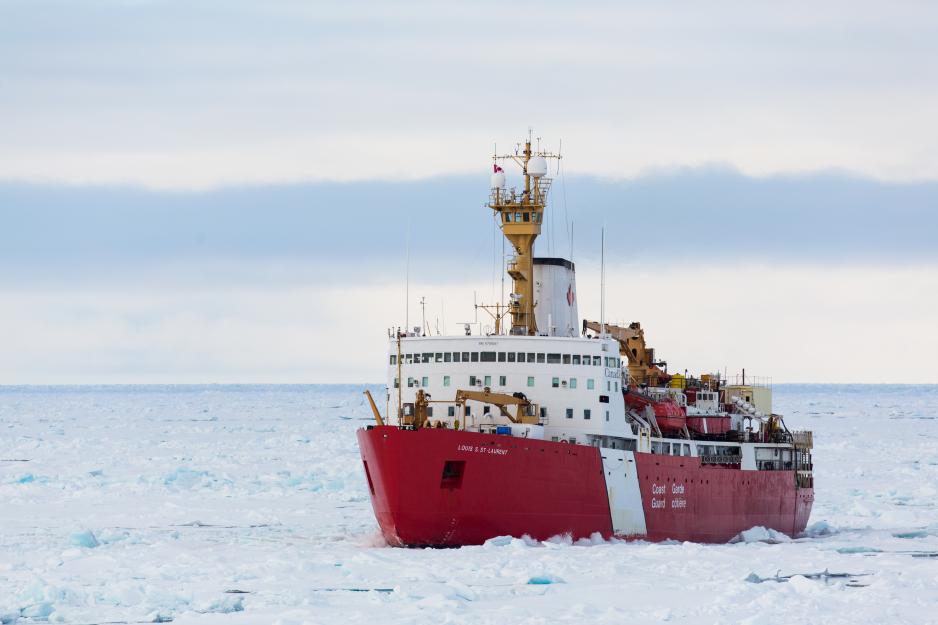Report Highlights Deficiencies in Canada's Surveillance of Arctic Waters

The audit focused on whether key federal organizations, such as the Canadian Coast Guard, built the maritime domain awareness needed to respond to safety and security risks and incidents associated with increasing vessel traffic in Arctic waters. Pictures is the Canadian Coast Guard Ship Louis S. St-Laurent. (Photo: Provided by Canada’s UNCLOS Program).
The federal government has not addressed long-standing issues that affect its surveillance of Canada’s Arctic waters, according to the Auditor General of Canada.
The Canadian Federal Government has not addressed long‑standing issues affecting its surveillance of Canada’s Arctic waters, a report from the Office of the Auditor General of Canada finds. The report was tabled this week in the House of Commons.
As a result, the federal organizations that are responsible for safety and security in the Arctic region do not have a full awareness of maritime activities in Arctic waters and are not ready to respond to increased surveillance requirements, the document states.
The main federal organizations which have primary surveillance roles are Fisheries and Oceans Canada, the Canadian Coast Guard, Environment and Climate Change Canada, National Defence and Transport Canada.
As the report notes, requirements are now growing due to increased interest towards the Arctic region and the increased access to Canadian Arctic waters as a result of warming climate. Foreign interest in the area is contributing to increase the likelihood of unauthorized access, safety incidents, illegal fishing, and marine pollution.
Infrastructure and equipment gaps
The unaddressed, long‑standing issues raised in the audit include incomplete surveillance, insufficient data about vessel traffic, a lack of effective means of sharing information on maritime traffic, and outdated fleets and equipment.
"The renewal of vessels, aircraft, satellites, and infrastructure needed to monitor maritime traffic and respond to safety and security incidents has been delayed to the point where some equipment will likely need to be retired before it can be replaced", Auditor General Karen Hogan said in her opening statement at the press conference.
"Examples include Transport Canada’s and the Canadian Coast Guard’s aging icebreakers and patrol aircraft that are nearing the end of their service lives. Although plans to replace these are underway, there is no contingency plan if the delivery of replacement vessels is further delayed. This could undermine Canada’s presence in Arctic waters".
The audit also found that some of the government’s infrastructure investments for Arctic waters surveillance, such as the Nanisivik Naval Facility, did little to improve surveillance and the capacity to respond to incidents.
“The government urgently needs to address the long‑standing issues noted in our audit to put equipment renewal on a sustainable path and protect Canada’s interests in the Arctic, including an improved capability to respond to threats and incidents”, Audtior General Hogan noted in her statement.
Canada and the Arctic
The Canadian Arctic has more than 162,000 kilometres of coastline - 75% of Canada’s total coastline.
Over the past 50 years, average summer sea-ice coverage in the Canadian Arctic has dropped by about 40% because of climate change.
This decline in sea ice, combined with new technologies, is making the Canadian Arctic more accessible to ships.
From 1990 to 2019, the number of voyages in Canadian Arctic waters more than tripled.
The number of ships, particularly foreign-flagged vessels, navigating the Canadian Arctic also increased significantly.
Vessel traffic declined in 2020 and 2021 because of temporary bans on entering the Canadian Arctic made in response to the Covid pandemic.
Traffic will likely increase again due to the restrictions having been lifted in March 2022.
Source: Auditor General of Canada.




